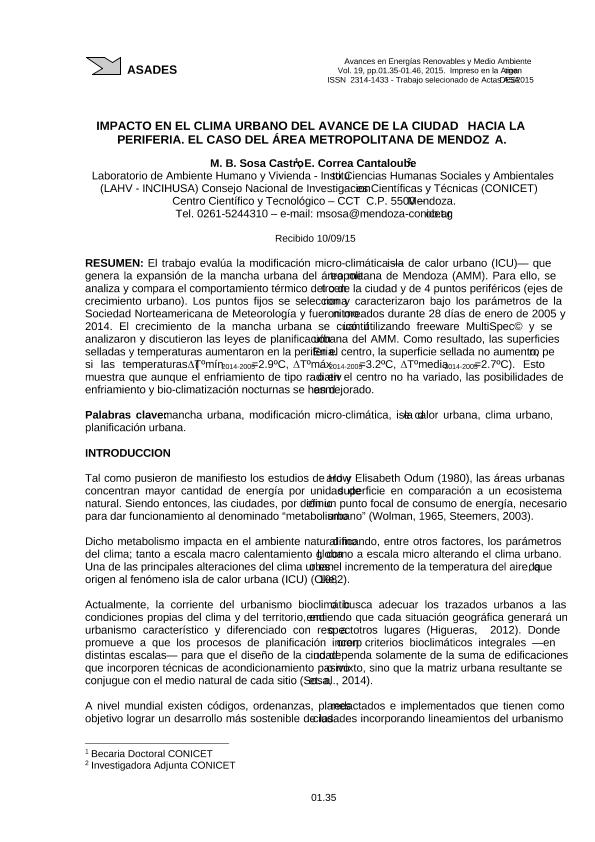Artículo
El trabajo evalúa la modificación micro-climática "isla de calor urbano (ICU)" que genera la expansión de la mancha urbana del área metropolitana de Mendoza (AMM). Para ello, se analiza y compara el comportamiento térmico del centro de la ciudad y de 4 puntos periféricos (ejes de crecimiento urbano). Los puntos fijos se seleccionaron y caracterizaron bajo los parámetros de la Sociedad Norteamericana de Meteorología y fueron monitoreados durante 28 días de enero de 2005 y 2014. El crecimiento de la mancha urbana se cuantificó utilizando freeware MultiSpec© y se analizaron y discutieron las leyes de planificación urbana del AMM. Como resultado, las superficies selladas y temperaturas aumentaron en la periferia. En el centro, la superficie sellada no aumento, perosi las temperaturas (ΔTºmín2014-2005=2.9ºC, ΔTºmáx2014-2005=3.2ºC, ΔTºmedia2014 2005=2.7ºC). Esto muestra que aunque el enfriamiento de tipo radiativo en el centro no ha variado, las posibilidades de enfriamiento y bio-climatización nocturnas se han desmejorado. The study evaluates the microclimatic modification -island urban heat (UHI)- that the urban Mendoza metropolitan area (MMA) expansion generates. In order to achieve that, the thermal behavior of the city downtown and 4 peripheral points (urban growth axes) were analyzed and compared. These fixed points were selected and characterized according to the American Meteorological Society parameters and were monitored during 28 days of January in 2005 and 2014. The growth of the MMA urban area was quantified by the MultiSpec© freeware and the legal urban planning framework were analyzed and discussed. As a result, the impervious surfaces and the air temperatures have increased on the periphery. In the city downtown, the impervious surface remains equal, but the air temperature is higher (∆Tºmin. 2014-2005= 2.9ºC, ∆Tºmax. 2014-2005= 3.2ºC, ∆Tºaverage 2014-2005= 2.7ºC). This situation shows that although the possibility of radiative cooling at the city center has not changed, the nocturnal cooling and bio-climatization possibilities have decrease.
Impacto en el clima urbano del avance de la ciudad hacía la periferia: El caso del área metropolitana de Mendoza
Fecha de publicación:
09/2015
Editorial:
Asociación Argentina de Energía Solar
Revista:
Avances en Energías Renovables y Medio Ambiente
ISSN:
2314-1433
e-ISSN:
0329-5184
Idioma:
Español
Tipo de recurso:
Artículo publicado
Clasificación temática:
Resumen
Archivos asociados
Licencia
Identificadores
Colecciones
Articulos(INCIHUSA)
Articulos de INST. DE CS. HUMANAS, SOC. Y AMBIENTALES
Articulos de INST. DE CS. HUMANAS, SOC. Y AMBIENTALES
Citación
Sosa, María Belén; Correa Cantaloube, Erica Norma; Impacto en el clima urbano del avance de la ciudad hacía la periferia: El caso del área metropolitana de Mendoza; Asociación Argentina de Energía Solar; Avances en Energías Renovables y Medio Ambiente; 19; 9-2015; 35-46
Compartir




